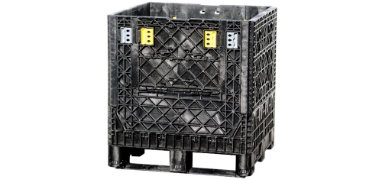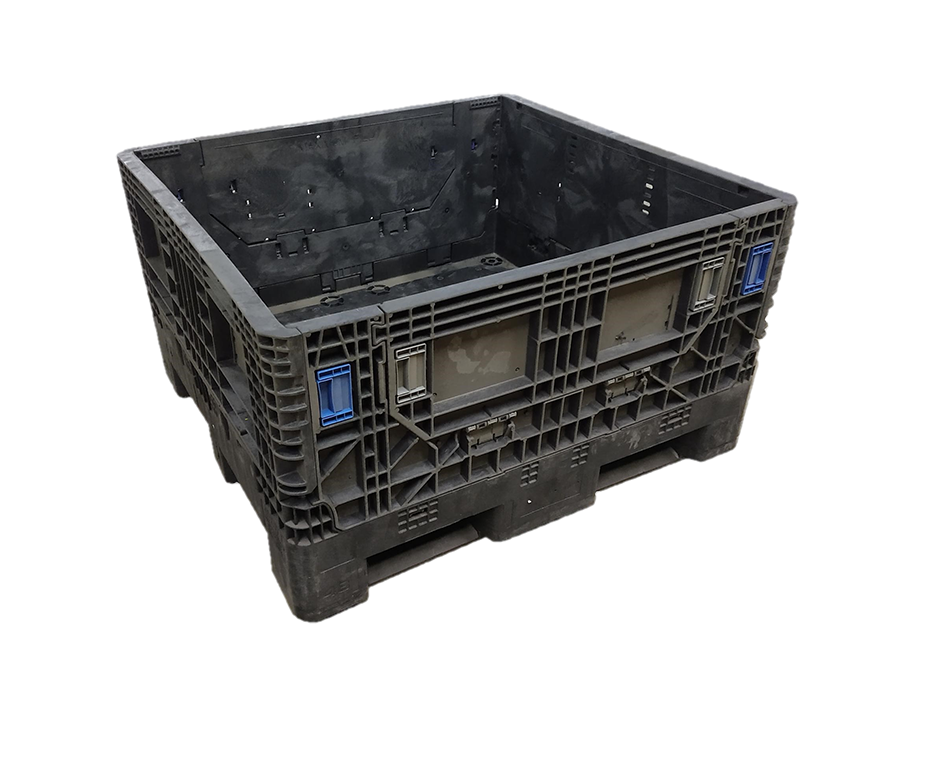Cutting-edge Solutions: Uncovering the Flexibility of Mass Containers in Different Industries
Mass containers have arised as a critical advancement across multiple markets. Their layout improves storage and transport effectiveness, accommodating diverse needs while advertising sustainability. Organizations in farming, manufacturing, and logistics report substantial improvements in functional procedures. However, real level of their effect might not yet be fully understood. Discovering the numerous applications and advantages of mass containers could expose understandings that improve sector criteria. What exists ahead for this progressing solution?
Enhancing Agricultural Efficiency With Bulk Containers
Just how can mass containers transform agricultural methods? In the domain of agriculture, bulk containers function as an essential innovation, enhancing efficiency and sustainability. They make it possible for farmers to store and transfer large quantities of plant foods, seeds, and grains, minimizing the demand for numerous smaller plans that commonly contribute to throw away. By utilizing bulk containers, farming operations can optimize their supply chains, lowering taking care of costs and time. These containers are developed for simple loading and discharging, permitting quick shifts between different phases of farming procedures.
Moreover, mass containers advertise far better supply management, making sure that producers have sufficient materials accessible without extra. This performance translates to reduced labor prices and boosted efficiency. In a field typically tested by rising and fall need and seasonal variants, the dependability and scalability offered by bulk containers offer a significant advantage, empowering farmers to concentrate on high quality and return.
Simplifying Production Processes Via Mass Solutions
Bulk solutions play a crucial role in simplifying manufacturing processes by facilitating reliable product handling and offering cost-efficient storage space choices. These containers aid keep an orderly production atmosphere, eventually boosting workflow and efficiency. As markets increasingly adopt mass options, they are likely to experience considerable improvements in operational effectiveness.
Effective Material Handling

Efficient material handling is essential for optimizing production processes, as it straight influences performance and cost-effectiveness. Utilizing bulk containers can substantially simplify operations by streamlining the activity and storage of materials. Their design enables very easy loading and discharging, decreasing the moment employees invest handling individual products. This efficiency not only reduces labor prices but also boosts workflow, making it possible for makers to respond swiftly to demand fluctuations. In addition, mass containers advertise better organization within facilities, assisting in fast access to materials and decreasing downtime. By applying these functional services, suppliers can improve total operational effectiveness, making sure that assembly line run smoothly and successfully while decreasing waste and source expense. Subsequently, mass containers play a crucial role in improving product handling practices.
Cost-Effective Storage Solutions
As makers seek to optimize their procedures, affordable storage space options come to be increasingly important. Mass containers provide a sensible means of keeping huge quantities of products, minimizing the requirement for numerous smaller storage space systems. This loan consolidation results in lower inventory costs, as bulk containers typically require much less handling and lead to lowered labor expenses. On top of that, their standardized sizes facilitate efficient piling and storage space, taking full advantage of storehouse room. By using bulk containers, suppliers can lessen waste and boost the general company of their centers. These containers are also created for durability, which can decrease substitute expenses with time. In general, integrating bulk containers into storage space methods allows makers to enhance operations while preserving earnings and efficiency in their supply chains.

Enhanced Manufacturing Process
Using mass containers substantially improves production process by simplifying the management of products throughout the manufacturing procedure. These containers help with reliable storage space and transport, decreasing the time invested in handling materials. Therefore, manufacturers can accomplish quicker turnaround times and lessen hold-ups in production. Mass containers also advertise better company, allowing teams to conveniently access basic materials when required, which better improves procedures. In addition, the standardized shapes and size of these containers enable maximized usage of warehouse space, adding to overall performance. By integrating bulk options right into their procedures, firms can enhance inventory control and minimize waste, ultimately causing enhanced productivity and an extra nimble manufacturing setting.
Changing Food Service Logistics
The food service sector is undertaking substantial makeover with the fostering of bulk containers, boosting storage abilities and optimizing area usage. Effective storage options make it possible for businesses to manage supply extra efficiently, while structured transport processes improve and reduce costs delivery times. Consequently, these developments are improving logistics and driving greater efficiency across the market.
Efficient Storage Space Solutions
Cutting-edge storage services are changing food solution logistics by enhancing efficiency and enhancing space utilization. Mass containers, developed for optimum capacity, enable food company to minimize squandered space while preserving simple access to items. These containers can be stacked and organized according to inventory demands, streamlining the storage space process. Furthermore, their longevity guarantees that food continue to be protected and risk-free, lowering spoilage and losses. With functions such as modular layouts and compatibility with numerous shelving systems, these containers can adjust to varied cooking area layouts. By utilizing reliable storage services, food service operations not only improve operations but additionally boost total performance, guaranteeing that resources are made use of efficiently to satisfy customer demands.
Streamlined Transportation Procedures
While several variables add to the performance of food solution logistics, streamlined transport processes play an essential duty in enhancing supply chain operations. The fostering of bulk containers considerably improves the motion of products, allowing for quicker loading and discharging at distribution. Their standardized dimensions facilitate effective piling and storage space, reducing squandered space throughout transportation. In addition, bulk containers reduce the need for extreme packaging, leading to decrease prices and lowered ecological impact. By making certain that products are safely carried, they minimize damage and perishing, which is important in the perishable food field. Generally, the assimilation of bulk containers right into transportation strategies not only enhances operational efficiency but additionally sustains lasting practices within the food solution industry.
The Function of Mass Containers in Drug Supply Chains
In the pharmaceutical sector, mass containers play a vital duty in making certain the risk-free and effective transport of raw materials and finished products. These containers are particularly designed to satisfy rigorous regulatory requirements, giving perfect security versus contamination and deterioration throughout transportation. Their robust construction enables the secure transport of sensitive products, such as active pharmaceutical active ingredients (APIs) and intricate solutions, while reducing the risk of damage.
In addition, mass containers promote structured handling and storage space procedures within storage facilities and manufacturing centers. Their standard dimensions allow compatibility with automated systems, enhancing efficiency and reducing labor prices. By utilizing bulk containers, pharmaceutical business can achieve substantial price financial savings via mass buying and minimized packaging waste.
Promoting Sustainability in Packaging Practices
The pharmaceutical market's enhancing reliance on mass containers has motivated a wider examination of sustainability in product packaging techniques across content different markets. As companies seek to minimize their environmental influence, innovative strategies to packaging have gotten grip. Bulk containers, created for reuse and recycling, provide a sensible solution. Their toughness extends product lifecycles, reducing the need for single-use product packaging.
Moreover, the shift towards biodegradable materials and environmentally friendly layers has ended up being indispensable in the style of these containers. This modification not just addresses waste reduction but also straightens with consumer demand for lasting products.
Industries such as food and cosmetics are adopting similar methods, acknowledging that sustainable product packaging can enhance brand track record. Joint campaigns between distributors and suppliers further advertise sustainability, motivating the advancement of closed-loop systems - used plastic containers. Ultimately, embracing sustainable product packaging practices is necessary for fostering a circular economic situation and alleviating the environmental impact throughout varied sectors
Affordable Transportation Solutions With Mass Containers

Moreover, mass containers enhance managing processes, leading to reduced labor costs and decreasing the threat of damages during transportation. Industries such as farming, chemicals, and pharmaceuticals benefit from the durability and effectiveness of these containers, which can stand up to extreme problems while making certain the stability of their components
Additionally, the recyclable nature of mass containers adds to long-lasting savings, as firms can depend on less, more long lasting devices rather than regularly replacing single-use packaging. In this way, bulk containers not only why not check here boost efficiency but also support general expense management in supply chain operations.
Customization and Adaptability in Bulk Container Design
While many bulk containers are made for common applications, their personalization and adaptability have actually ended up being necessary attributes for markets with unique needs. Makers now use an array of choices, enabling clients to customize containers to specific dimensions, materials, and performances. This adaptability allows companies to optimize storage and transport processes, guaranteeing compatibility with various handling systems.
For example, the food and pharmaceutical sectors usually need containers that meet stringent health and safety criteria. Personalized designs might include functions such as tamper-proof seals, easy-to-clean surface areas, and specialized air flow systems. In the agricultural sector, mass containers can be tailored to help with the transportation of diverse assets, from grains to liquids, boosting functional efficiency.
Inevitably, the capability to tailor bulk containers not just increases performance however likewise sustains sustainability initiatives by minimizing waste and taking full advantage of resource application throughout several markets. This versatility placements bulk containers as flexible services in today's dynamic market.
Frequently Asked Concerns
What Materials Are Mass Containers Generally Made From?
Mass containers are generally made from products such as high-density polyethylene (HDPE), polypropylene, steel, or light weight aluminum. These materials offer sturdiness, resistance to chemicals, and the ability to securely store and transfer numerous items across sectors.
Just How Are Bulk Containers Cleaned In Between Uses?
Mass containers are typically cleaned using high-pressure washing, vapor cleaning, or chemical sanitization techniques (used bulk containers). The cleansing procedure warranties that deposits are eliminated, preventing contamination and preserving the high quality of contents for subsequent uses

Can Bulk Containers Be Reused Several Times?
Yes, bulk containers can be recycled multiple times. Their robust design permits repeated usage across numerous applications, offered they are properly cleansed and preserved after each use to ensure safety and hygiene requirements.
What Are the Weight Purviews for Bulk Containers?
Weight limits for mass containers normally range from 1,000 to 3,000 pounds, depending upon the product and design. Specs may vary by supplier, so it is essential to seek advice from guidelines for particular container types.
Exist Conventional Dimensions for Bulk Containers?
Yes, there are standard sizes for mass containers, typically varying from 20 to 40 cubic feet. These dimensions facilitate efficient storage space and transport throughout various industries, making sure compatibility with tools and optimizing area application.
Utilizing mass containers can significantly enhance procedures by streamlining the motion and storage space of products. In addition, bulk containers advertise better organization within centers, promoting fast accessibility to products and minimizing downtime. Bulk containers supply a functional ways of keeping big quantities of materials, decreasing the need for multiple smaller sized storage systems. The food solution industry is undergoing substantial change with the adoption of mass containers, boosting storage space capabilities and maximizing space usage. Mass containers promote streamlined handling and storage space procedures within warehouses from this source and manufacturing facilities.